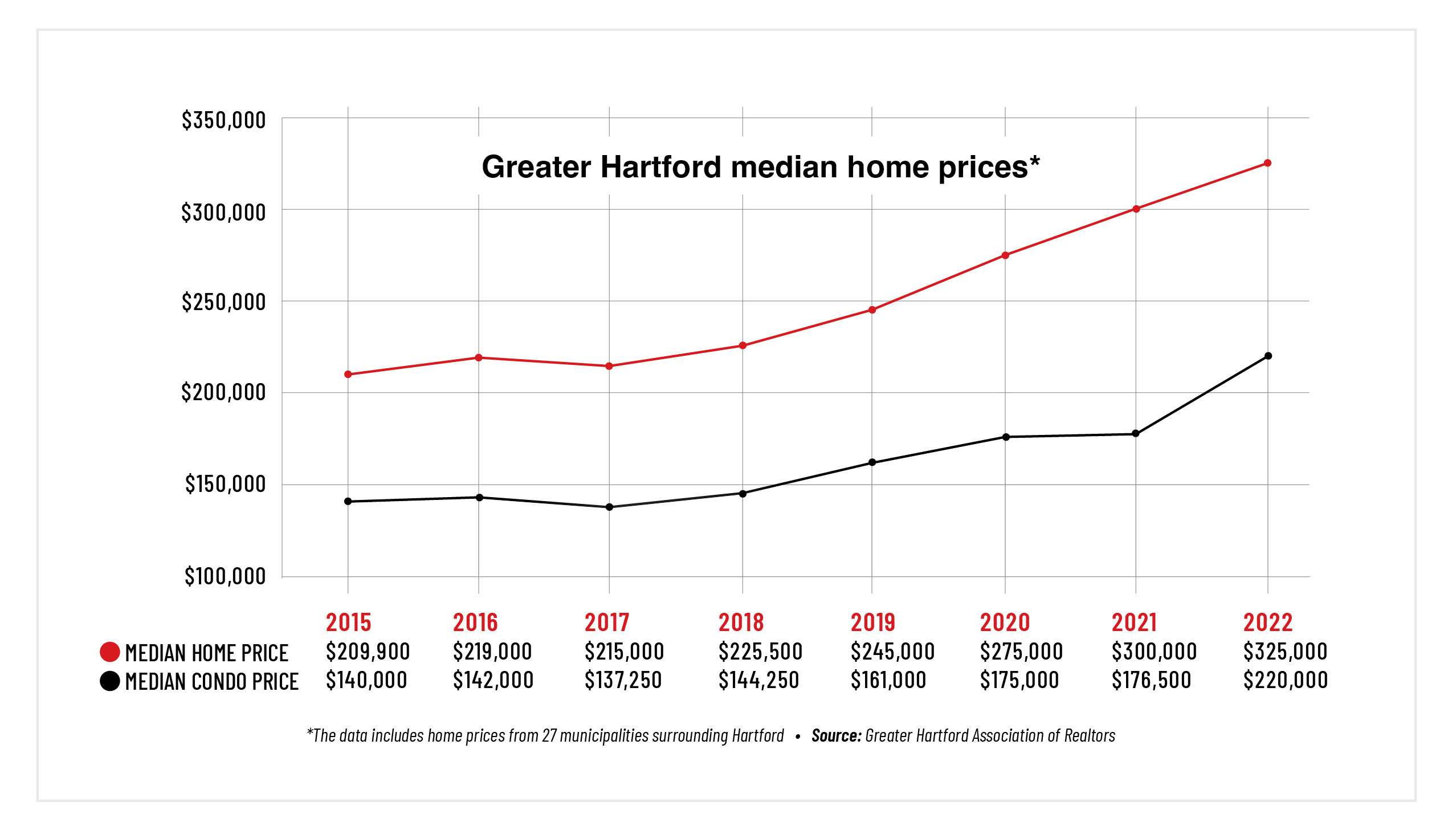
Processing Your Payment
Please do not leave this page until complete. This can take a few moments.
- News
-
Editions
View Digital Editions
Biweekly Issues
- April 29, 2024
- April 15, 2024
- April 1, 2024
- March 18, 2024
- March 4, 2024
- February 19, 2024
- February 5, 2024
- January 22, 2024
- January 8, 2024
- + More
Special Editions
- Lists
- Viewpoints
- HBJ Events
- Business Calendar
- Custom Content
Business, affordable housing advocates see common foe in CT’s high housing costs
 HBJ PHOTO | MICHAEL PUFFER
Clive Cunliffe, North American president for Pietro Rosa, outside the Farmington factory of New England Airfoil.
HBJ PHOTO | MICHAEL PUFFER
Clive Cunliffe, North American president for Pietro Rosa, outside the Farmington factory of New England Airfoil.
More Information
Inside an ordinary-appearing factory in Farmington, New England Airfoil Products staff machine parts used in Lockheed Martin F-35 Lightning II fighter jets, M1 Abrams tanks, power plants and other high-tech applications.
New England Airfoil’s staff count peaked at 172 around 2019, then rapidly dropped to around 100 after the COVID-19 pandemic hit and orders were canceled or placed on hold.
Now, new business is pouring in, and New England Airfoil is on a recruitment drive. An attempt to hire 14 engineers and quality assurance staff in the three months leading to Christmas had, as of Dec. 12, produced only six hires — even with salaries ranging from $80,000 to $110,000.
The company anticipates needing 30 additional staff in 2023.
Clive Cunliffe, North American president for Pietro Rosa — New England Airfoil’s parent company — said Connecticut’s high costs of housing and living play a big part in the recruitment challenges.
“We tried to employ someone three weeks ago coming from out of state,” Cunliffe recalled, during a mid-December interview. “They were very interested in the job. It was the ideal job for them, but they didn’t want to move here because the housing was too expensive. We were going to offer them a relocation allowance, but they were buying a house and it was outside their affordability range.”
With an acute labor shortage leaving approximately 100,000 unfilled jobs in Connecticut, companies like New England Airfoil have reached well beyond state lines to recruit. But Connecticut, already a high-cost state, has seen housing prices explode during the pandemic.
This has prompted business leaders to team up with affordable housing advocates and others around the issue and to develop policy proposals that incentivize affordable housing.
For the first time, affordable housing is a top issue on the Connecticut Business & Industry Association’s priority list for the 2023 legislative session.
“We want to focus on spurring affordable housing development, specifically in towns that have the transportation infrastructure there already,” said Wyatt Bosworth, a CBIA lobbyist. “We’re really pushing for government incentives to push towns to zone affordable housing in mixed-use developments in areas where a CTfastrak station might be, where a rail station might be, where bus routes are prevalent.”

New proposal
CBIA staffers have heard a rising chorus of complaints from businesses struggling to recruit. Company leaders often cite lack of affordable housing and adequate transportation as key drivers, Bosworth said.
“Now is the time to bring everybody to the table and make this a priority because work-from-home is here to stay,” Bosworth said. “We’ve seen people migrate to Connecticut from New York City and the Boston metro area because Connecticut is a great place to live. We have great schools. We have parks. We have beaches. We have rural areas. We have urban areas. But the one thing we are lacking is affordable housing that can attract and retain new workers.”
The CBIA is hammering out a proposal — to be called “Work, Live, Ride” — with a coalition of affordable housing advocates working under the Desegregate CT banner, as well as the Connecticut Conference of Municipalities (CCM).
So far, the proposal is coalescing around two main thrusts, Bosworth said. One is better coordination of incentives available through various state agencies to assist transit-oriented development.
Another would leverage tax incentives to promote development in brownfields and federally designated “opportunity zones,” he said.
“Maybe you are on the fence about expanding affordable housing in your area — but you may be swayed by government incentives to do so around your transit district,” Bosworth said.
New allies, new approach
Connecticut does currently have a law that promotes affordable housing, but housing advocates have said more needs to be done to encourage further development.
Known as 8-30g, the more than 30-year-old law encourages, but doesn’t require, cities and towns to have 10% of their housing stock reserved as affordable.
For individual developments to qualify, at least 15% of units must be restricted to low-income households and at least another 15% to moderate-income households.
Affordable is generally understood as housing that costs no more than 30% of a household income.
Pete Harrison, director of Desegregate CT, said his two-year-old affordable housing coalition proposed legislation last year in concert with CCM, but this is the first time CBIA is joining the effort. He said discussions with the business advocacy group are leading to a common legislative proposal.
“The crisis has gotten so bad that folks that were not really checked in on the issue are being forced to by their own members, their own experiences and it’s just an issue that is unavoidable,” Harrison said. Now, Harrison said, the crisis has become more tangible.
“Clearly, it’s beyond the anecdotal phase now, where business leaders are having a hard time recruiting people and keeping people,” Harrison said. “It’s not this quiet-quitting crap. It’s not that people don’t want to work today. It’s that people can’t stay in Connecticut and they are moving to places they can afford to live and work.”
Harrison said the legislative policy being crafted by CCM, CBIA and Desegregate CT differs from previous failed approaches because it would not be compulsory. Instead it would be optional for cities and towns, fueled with incentives such as planning assistance and preferential treatment for existing state development grants.
“We learned hard lessons last year in the short session,” Harrison said. “One, the mandate approach is a political nonstarter in Connecticut. Even folks who were supportive don’t want the state to do something without local support behind it.”
Harrison said housing advocates also learned to avoid a “one-size-fits-all approach,” particularly on density requirements, because every community’s needs are different.
Lastly, past legislative efforts focused on 40 communities with passenger rail stations or stops along the CTfastrak rapid bus route. The next proposal will have a broader focus, Harrison said.
“We really want to see more homes and more services being concentrated in places in Connecticut that already have public transportation,” he said.
Lamont admin. support
Alexandra Daum, the newly named commissioner of the state Department of Economic and Community Development, acknowledges the high cost of living as a liability for Connecticut’s efforts to recruit and retain a labor force.
Daum said there is a clear link between 100,000 unfilled positions in Connecticut and “extremely tight housing supply.”
It’s one of the reasons that the Lamont administration’s $100 million Connecticut Communities Challenge grant program has focused on assisting private development in urban centers, particularly around mass transit, Daum said. The state has allocated $81.5 million of that fund so far with the remaining monies to be distributed in 2023.
“So, I think that’s a place where we can make a difference,” Daum said. “We have dollars, we have an opinion on where to build the housing in order to make sure it serves our businesses and fills those positions.”
Daum said the state’s brownfield cleanup grant program — which typically allocates about $25 million yearly — has increasingly focused on cleanups that have an end use in mind.
“All things being equal, we prefer a project that is going to create more (housing) units in an area that already has good infrastructure and good transit,” Daum said.
Legislative support
Affordable housing as an economic imperative has some baked-in support from legislative leadership.
Newly elected state Sen. MD Rahman (D-Manchester) has been picked by party leaders to serve as co-chair of the General Assembly’s Planning and Development Committee, one of the possible first stops for affordable housing legislation.
Rahman is a self-made businessman and philanthropist, claiming more than 1,000 employees in health care, construction and real estate investment ventures.
Rahman said he is constantly searching for employees and agrees a lack of affordable housing makes it more difficult.
“Affordable housing is really important for the economy,” Rahman said. “If someone has a job and can’t find affordable housing close by, how are they going to keep that job?”
CT’s rising housing costs
In November 2015, the median cost of a single-family home sold in Greater Hartford was $209,900, according to the Greater Hartford Association of Realtors. Three years later, in November 2018, the median home sale price was $225,500, a 7.4% increase.
In the following three years, between 2019 and 2022, the median cost for a single-family home sold in Greater Hartford rose $80,000, up to $325,000, as of November 2022. That’s a 32.6% jump during the pandemic.

2022 Giving Guide
This special edition informs and connects businesses with nonprofit organizations that are aligned with what they care about. Each nonprofit profile provides a crisp snapshot of the organization’s mission, goals, area of service, giving and volunteer opportunities and board leadership.
Learn more
Subscribe
Hartford Business Journal provides the top coverage of news, trends, data, politics and personalities of the area’s business community. Get the news and information you need from the award-winning writers at HBJ. Don’t miss out - subscribe today.
Subscribe
2024 Book of Lists
Delivering Vital Marketplace Content and Context to Senior Decision Makers Throughout Greater Hartford and the State ... All Year Long!
Read Here-
2022 Giving Guide
This special edition informs and connects businesses with nonprofit organizations that are aligned with what they care about. Each nonprofit profile provides a crisp snapshot of the organization’s mission, goals, area of service, giving and volunteer opportunities and board leadership.
-
Subscribe
Hartford Business Journal provides the top coverage of news, trends, data, politics and personalities of the area’s business community. Get the news and information you need from the award-winning writers at HBJ. Don’t miss out - subscribe today.
-
2024 Book of Lists
Delivering Vital Marketplace Content and Context to Senior Decision Makers Throughout Greater Hartford and the State ... All Year Long!
ABOUT
ADVERTISE
NEW ENGLAND BUSINESS MEDIA SITES
No articles left
Get access now
In order to use this feature, we need some information from you. You can also login or register for a free account.
By clicking submit you are agreeing to our cookie usage and Privacy Policy
Already have an account? Login
Already have an account? Login
Want to create an account? Register
Get access now
In order to use this feature, we need some information from you. You can also login or register for a free account.
By clicking submit you are agreeing to our cookie usage and Privacy Policy
Already have an account? Login
Already have an account? Login
Want to create an account? Register






0 Comments